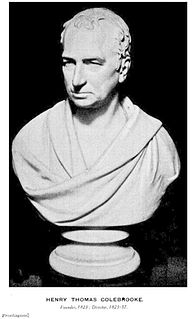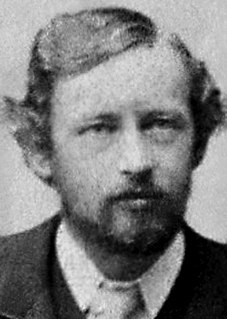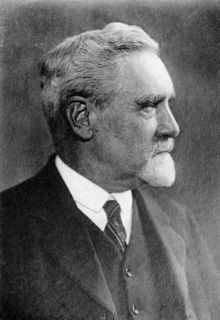
Jens Otto Harry Jespersen was a Danish linguist who specialized in the grammar of the English language.

Andrew Lang (1844–1912) was a Scottish poet, novelist, literary critic, and contributor to the field of anthropology. He is best known as a collector of folk and fairy tales. The Andrew Lang lectures at the University of St Andrews are named after him.

Henry Thomas Colebrooke FRS FRSE was an English orientalist and mathematician. He has been described as "the first great Sanskrit scholar in Europe".
Henry Watson Fowler was an English schoolmaster, lexicographer and commentator on the usage of the English language. He is notable for both A Dictionary of Modern English Usage and his work on the Concise Oxford Dictionary, and was described by The Times as "a lexicographical genius".

William Ralph Inge was an English author, Anglican priest, professor of divinity at Cambridge, and Dean of St Paul's Cathedral, which provided the appellation by which he was widely known, Dean Inge. He was nominated for the Nobel Prize in Literature three times.

Charles Howard Hinton was a British mathematician and writer of science fiction works titled Scientific Romances. He was interested in higher dimensions, particularly the fourth dimension. He is known for coining the word "tesseract" and for his work on methods of visualising the geometry of higher dimensions.
Albert Charles Seward FRS was a British botanist and geologist.
The Reverend Joseph Hallett Batten DD FRS was principal of the East India Company College.
James Fitzmaurice-Kelly FBA (1858–1923) was a British writer on Spanish literature.
Alfred Paul Victor Morel-Fatio was the leading French Hispanist of his time, educated at École des chartes, Paris.

John Holland Rose was an influential English historian who wrote famous biographies of William Pitt the Younger and of French emperor Napoleon Bonaparte. He also wrote a history of Europe, entitled The Development of the European Nations among other historical works. He was Vere Harmsworth Professor of Imperial and Naval History at the University of Cambridge between 1919 and his retirement in 1934.

Frank Evers Beddard FRS FRSE was an English zoologist. He became a leading authority on annelids, including earthworms. He won the Linnean Medal in 1916 for his book on oligochaetes.
The Faculty of Medieval and Modern Languages at the University of Oxford, England, was established in 1903. It is part of Oxford's Humanities Division.
Walter Alison Phillips was an English historian, a specialist in the history of Europe in the 19th century. From 1914 to 1939 he was the first holder of the Lecky chair of History in Trinity College, Dublin. Most of his writing is in the name of W. Alison Phillips, and he was sometimes referred to as Alison Phillips.
Sir John Edward Power Wallis was a British lawyer who served as the Advocate-General of Madras from 1900 to 1906, and Chief Justice of the Madras High Court from 1914 to 1921.
Edward Adolf Sonnenschein was an English classical scholar and writer on Latin grammar and verse.












